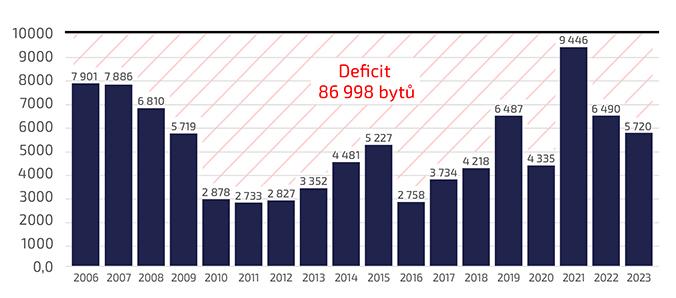Prague is facing an alarming shortage of permitted apartments
According to expert estimates, at least 10,000 flats need to be permitted and built in the capital every year. In the long term, however, only around 5,000 flats are permitted annually. And as the ČSÚ figures published today show, the year 2023 was no exception. Only 5,720 flats were permitted in the capital last year, of which 4,242 were in apartment buildings. This is a 12% and 20% drop year-on-year, respectively. Thus, the capital continues to deepen its housing deficit, which has already exceeded 85,000 apartments. The lengthy and inadequate permitting of new construction is having a negative impact on housing affordability. Both owner-occupied and rental. At the same time, the number of planned projects in Prague is constantly growing. At the end of last year, there were more than 143,000 flats worth more than CZK 1.5 trillion. Potentially, this represents many billions of euros in revenue for the state treasury. At a 12% VAT rate, the state could raise over CZK 160 billion from these flats alone, and Prague could raise tens of billions more from subsidies. Moreover, these flats would provide housing for around 300 000 people and could significantly help solve the housing crisis. It is therefore incomprehensible that the state has been so sluggish in dealing with the issue of permitting processes. The hopes placed in the new building law are turning into panic because of the constant delays and uncertainty. Less than half a year before the law is due to come into full effect, its full form is still unclear and the tender for digitalisation has been stopped by the Office for the Protection of Competition. Thus, the Czech construction industry is realistically facing the threat of a collapse of the system of permitting new construction, which could bring huge losses for investors, but also for the state.
Source: Central Group










